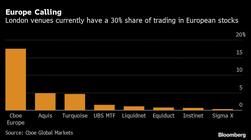 The face of the Great Clock of the Elizabeth Tower, commonly referred to as Big Ben, is pictured at the Houses of Parliament in London on Aug 17, 2017, as a red London bus crosses Westminster Bridge. (TOLGA AKMEN / AFP)
The face of the Great Clock of the Elizabeth Tower, commonly referred to as Big Ben, is pictured at the Houses of Parliament in London on Aug 17, 2017, as a red London bus crosses Westminster Bridge. (TOLGA AKMEN / AFP)
The golden age of the City of London began with a big bang. It’s ending with a whimper.
Fears that the finance powerhouse that emerged from Margaret Thatcher’s 1986 deregulation - known as the Big Bang - will gradually be dismantled have deepened with a recent flurry of announcements about some business heading to the European Union (EU) as Britain enters the last month of the Brexit transition period without a financial-services deal in sight.
London Stock Exchange Group Plc’s stock trading platform Turquoise Europe will go live in Amsterdam Monday, joining other trading venues like Cboe Europe and Aquis Exchange Plc setting up shop on the continent as part of their no-deal Brexit plans
The latest shift comes Monday at 8 am, when London Stock Exchange Group Plc’s (LSE) stock trading platform Turquoise Europe goes live in Amsterdam. It joins other trading venues like Cboe Europe and Aquis Exchange Plc setting up shop on the continent as part of their no-deal Brexit plans, a contrast with the late 1980s, which ushered in a period where London became the place to be for equities trading.
“The City of London has been thrown to the lions,” said Alasdair Haynes, chief executive officer at Aquis, adding that the United Kingdom could lose even more stock trading than it expects if giant US asset managers like BlackRock Inc decide to trade in Paris and Amsterdam.
ALSO READ: EU finance players await 'peak' Brexit uncertainty
Last week, Goldman Sachs Group Inc said it had applied to French regulators to open its SIGMA X Europe stock platform in Paris from Jan 4. Goldman partner Elizabeth Martin said that she expects most of the 8.6 billion euros (US$10 billion) a day in London-based European share trading to shift to the bloc.
Aquis has already established a platform in the French capital. It went live with more than 1,700 European shares earlier this month. Other trading venues like Liquidnet have outposts in Dublin to ensure they can service clients.
“We are expecting a big bang on Jan 4,” said David Howson president of Cboe Europe, the largest of London’s stock trading platforms, which opened its own venue in the Dutch capital last year. “The industry has never had to move this much flow overnight.”
It’s not just stock dealing that’s shifting. Brussels disappointed London swap traders last week when its markets regulator said that derivatives need to change hands on EU-based platforms from January. That means trillions of dollars of transactions is at risk of being transacted outside of the UK.

Land grab
The bloc has already made a land grab for London’s euro swaps clearing business, urging its banks to accelerate a shift to Europe. Deutsche Boerse AG’s Eurex Clearing has built up a 19 percent share of the business over recent years although it is dwarfed by London’s market share.
In recent weeks, Goldman and JPMorgan Chase & Co have indicated that between them more than 300 staff will move to continental cities. Goldman is shifting as much as US$60 billion in assets to Frankfurt, while JPMorgan is moving about US$230 billion to the German city.
READ MORE: EU leaders urged to step up preparations for no-deal Brexit
It’s not just stock dealing that’s shifting. Trillions of dollars of transactions are at risk of being transacted outside of the UK as the EU markets regulator said derivatives need to change hands on EU-based platforms from January
Consultancy EY said in a new report Monday that only 10 percent of big financial services firms are planning to establish or expand operations in the UK in the coming year, discouraged by the uncertainties of Brexit and the COVID-19 pandemic. That’s down from 45 percent in April.
In a report last month, EY said that the 7,500 roles and 1.2 trillion pounds (US$1.6 trillion) in assets that have moved already may just be the beginning. It expects further shifts in personnel and assets once the UK’s transition period officially ends.
That bodes ill for the UK, where finance employs more than one million people, makes up about 7 percent of the economy and accounts for more than a 10th of all tax revenue. Despite that, the industry has garnered little of the attention bestowed on fishing, which makes up just 0.1 percent of the UK economy, in the protracted Brexit negotiations.
Talent pool
To be sure, London’s long-standing advantages of the English language and legal system and a deep talent pool mean it won’t be overtaken anytime soon. And a last-minute agreement with the EU on financial services could still happen.
READ MORE: Share traders sweat on Brexit deal
The LSE said it would call off its plan for Turquoise Europe if the EU declared that Britain can host trading services for EU shares, part of a process known as equivalence. Such an agreement remains a possibility.
But time is running out. And without an agreement London’s status as Europe’s financial hub will no longer be in its hands.
“The kingmakers here will be the Americans,” Aquis CEO Haynes said. “There’s no guarantee they will still trade in London. They will follow the liquidity.”


